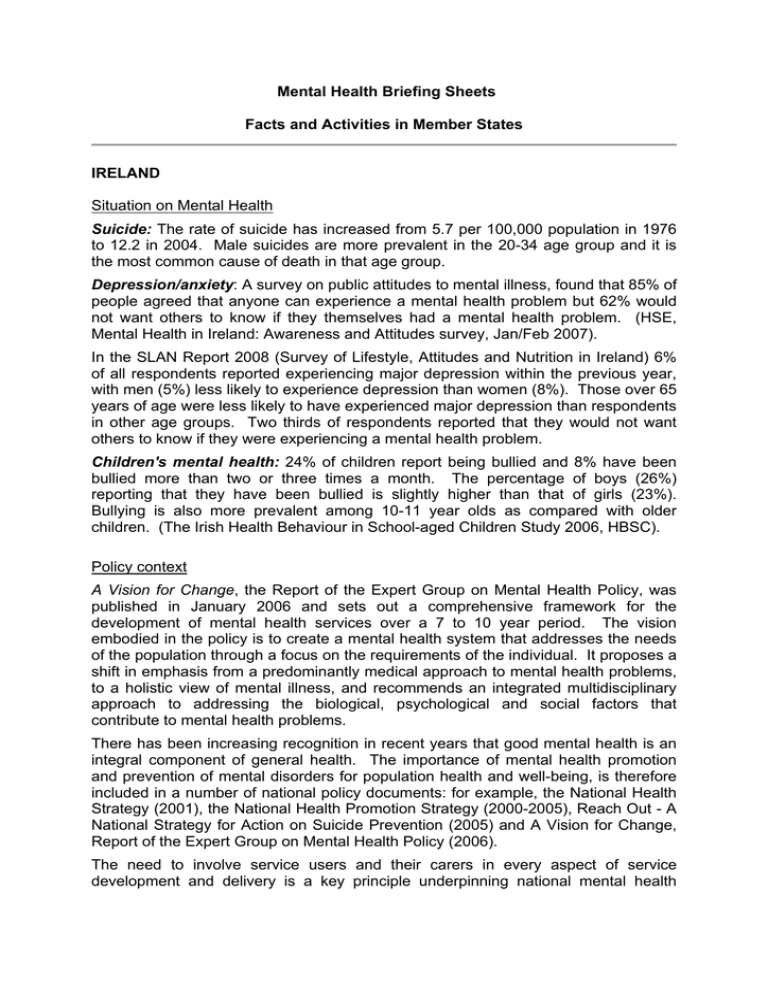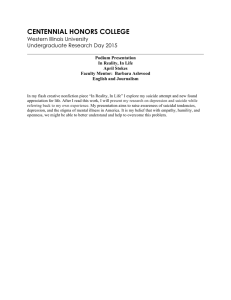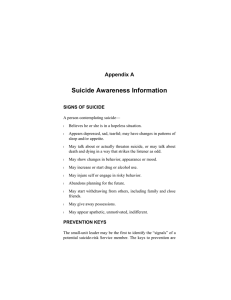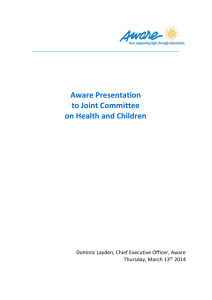Mental Health Briefing Sheets Facts and Activities in Member States IRELAND
advertisement

Mental Health Briefing Sheets Facts and Activities in Member States IRELAND Situation on Mental Health Suicide: The rate of suicide has increased from 5.7 per 100,000 population in 1976 to 12.2 in 2004. Male suicides are more prevalent in the 20-34 age group and it is the most common cause of death in that age group. Depression/anxiety: A survey on public attitudes to mental illness, found that 85% of people agreed that anyone can experience a mental health problem but 62% would not want others to know if they themselves had a mental health problem. (HSE, Mental Health in Ireland: Awareness and Attitudes survey, Jan/Feb 2007). In the SLAN Report 2008 (Survey of Lifestyle, Attitudes and Nutrition in Ireland) 6% of all respondents reported experiencing major depression within the previous year, with men (5%) less likely to experience depression than women (8%). Those over 65 years of age were less likely to have experienced major depression than respondents in other age groups. Two thirds of respondents reported that they would not want others to know if they were experiencing a mental health problem. Children's mental health: 24% of children report being bullied and 8% have been bullied more than two or three times a month. The percentage of boys (26%) reporting that they have been bullied is slightly higher than that of girls (23%). Bullying is also more prevalent among 10-11 year olds as compared with older children. (The Irish Health Behaviour in School-aged Children Study 2006, HBSC). Policy context A Vision for Change, the Report of the Expert Group on Mental Health Policy, was published in January 2006 and sets out a comprehensive framework for the development of mental health services over a 7 to 10 year period. The vision embodied in the policy is to create a mental health system that addresses the needs of the population through a focus on the requirements of the individual. It proposes a shift in emphasis from a predominantly medical approach to mental health problems, to a holistic view of mental illness, and recommends an integrated multidisciplinary approach to addressing the biological, psychological and social factors that contribute to mental health problems. There has been increasing recognition in recent years that good mental health is an integral component of general health. The importance of mental health promotion and prevention of mental disorders for population health and well-being, is therefore included in a number of national policy documents: for example, the National Health Strategy (2001), the National Health Promotion Strategy (2000-2005), Reach Out - A National Strategy for Action on Suicide Prevention (2005) and A Vision for Change, Report of the Expert Group on Mental Health Policy (2006). The need to involve service users and their carers in every aspect of service development and delivery is a key principle underpinning national mental health policy. A National Service User Executive has been established to promote and support the role of service users throughout the mental health services. Intersectorally mental health is also supported through a number of related government policy documents such as: the National Children's Strategy, the National Anti-Poverty Strategy, etc. There is evidence of increased engagement with other statutory, non-statutory agencies and community and social partners in implementing action for the improvement of mental health. Examples of activities on priority areas Prevention of suicide and depression A National Strategy for Action on Suicide Prevention "Reach Out" was published in 2005 and a National Office for Suicide Prevention (NOSP) was established within the Health Service Executive. The Strategy suggests a range of measures such as a positive mental health promotion campaign, education and training in communities / professional groups, improved / early intervention in primary care / emergency settings and a review of bereavement support services. Targets for a reduction in suicide and repeated self harm have been agreed with the NOSP. ASIST (Applied Suicide Intervention Skills Training) – 100 trainers have delivered the 2 day programme to 5,000 professionals and community leaders in the last 4 years. There are 3 national helplines- Samaritans (24/7 for those feeling depressed or suicidal), Teenline and Childline. Following the Commission decision 2007/698/EC reserving the telephone number 116123 for emotional support help lines across Europe, the number has been assigned in Ireland to the Samaritans and will become operational in Autumn 08. A National Registry of Deliberate Self-Harm has been operating in general hospitals in Ireland since 2002. The National Suicide Research Foundation 2005 Annual Report indicates that 10,227 people presented in A&E having self harmed; while 60% were assessed by a mental health professional, 23% received psycho-social assessment from A&E staff and the remainder left before a next care recommendation could be made. ‘Headline’ a national media monitoring programme which was launched in April 2007 aims to promote responsible media coverage of mental health and suicide related issues. Mental health in youth and education Family support and parenting programmes include home visiting programmes (Community Mothers, Life Start) and peer-led parent training initiatives (Fás le Chéile). A scheme is in place whereby all mothers are visited by a Public Health Nurse within 48 hours of their discharge from a maternity hospital. Health Promoting Schools initiatives are implemented across the country. The “Social, Personal and Health Education” programme (SPHE), which includes mental health promotion and socio-emotional learning modules, is now part of the curriculum for all pupils in primary schools and has been compulsory in the junior cycle of second level schools since September 2003. 2 Anti-bullying programmes together with the Mental Health Matters programme are also implemented. The Irish Society for the Prevention of Cruelty to Children, the National Youth Council and the National Youth Federation have several programmes and initiatives addressing the promotion of mental health and the prevention of mental disorders in children. SpunOut is a youth-led media initiative covering all aspects of youth information, health, lifestyle and activism. Their webpage - www.SpunOut.ie- aims to guide young people through life with quality information and support as well as providing a platform for young people to express their opinions, realise that they are not alone and get heard. Mental health at the workplace New legislation on Health and Safety for workplaces includes explicit reference to Health Promotion. Initiatives include the implementation of workplace stress reduction programmes and work life balance initiatives. Mental health in older people National policies addressing this issue are: Health and Well-being for older people – a strategy for 2001-2006, An Action Plan for Dementia (2000), and the National Council on Ageing and Older People Healthy Ageing Programme. There are a number of active retirement initiatives and the programme ‘Go for Life’, which is available nationally, encourages participation of older people in physical activity. The "Report of the Working Group on Residential Services for the Person with Dementia" was published by the Health Services Executive in June 2007. In 2008, the Executive also established a National Working Group on Dementia, to inform future policy and planning in this area. Combating stigma and social exclusion The National Health Strategy "Quality and Fairness: A Health System for You" (2001) calls for the development of a new action programme for mental health including mental health promotion and stigma reduction. It is considered that the delivery of mental health services in specialist psychiatric units, in isolation of the community in which they operate, promotes the continuing exclusion and stigmatisation of those with mental health problems. The emphasis therefore is on the delivery of mental health services through multi-disciplinary community mental health teams, and appropriate admission to acute general hospitals. A mental health awareness campaign ‘Your Mental Health’ was launched by the Health Services Executive in 2007 and aims to improve awareness of good mental health (www.yourmentalhealth.ie). This is already showing recognised improvements in attitudes to mental health amongst the population. A complementary media campaign ‘Challenging Attitudes to Mental Health’ has been undertaken by The National Disability Authority. That campaign focuses attention on the stigma that attaches to mental health difficulties and attempts to challenge public attitudes in this regard, by highlighting the wealth of diversity in a person’s character and on their achievements. 3 In November 2007, The National Economic and Social Forum (NESF) published a new Report on Mental Health and Social Inclusion. The Report recommends major changes in the way mental health is dealt with by employers, local authorities, trade unions and the health sector. The recommendations in the Report are designed to promote greater social inclusion for people with mental health problems. 1 Sources of information for the production of this briefing sheet: 1 Version revised and updated by Member State Mental Health in Youth and Education. Consensus paper prepared by Jané-Llopis & Braddick (2008) Mental Health and the Workplace. Consensus paper prepared by McDaid (2008) Mental Health in Older People. Consensus paper prepared by Jané-Llopis & Gabilondo (2008) Prevention of Depression and Suicide. Consensus paper prepared by Wahlbeck & Mäkinen (2008) Contributions from Member States - 2008, available at: http://www.ec-mental-health-process.net/ EMIP Consortium (2006). Country reports: Implementation of Mental Health Promotion and Prevention Policies and Strategies in the EU member states and applicant countries (EMIP) McCollam et al., (2008). Mental Health in the EU - Key facts, figures and activities. A background paper. Jané-Llopis & Anderson (Eds) (2006). "Mental health promotion and mental disorder prevention across European Member States: a collection of country stories" (2nd edition), Luxembourg: European Communities 4




